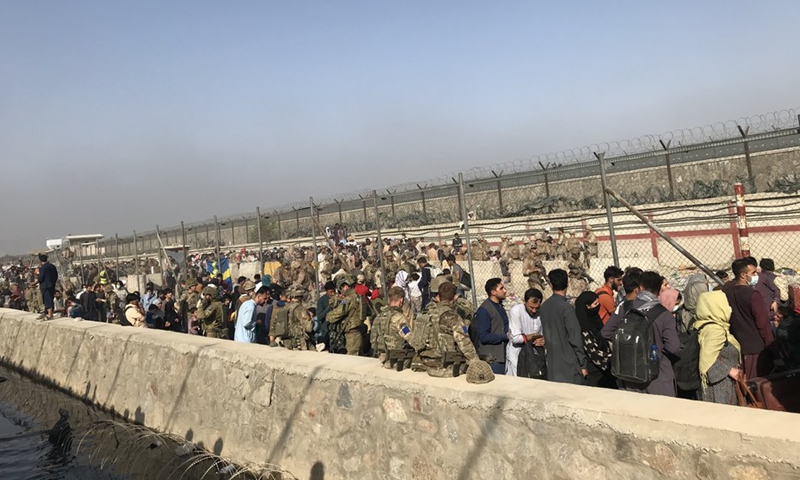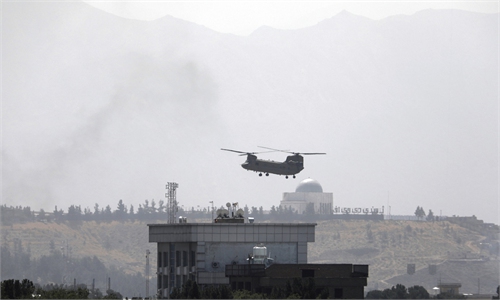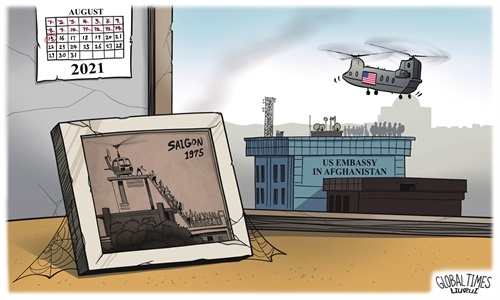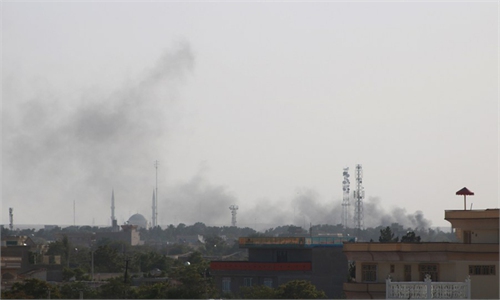
Photo taken on Aug. 22, 2021 shows foreign forces at the entering gate of Kabul airport in Kabul, Afghanistan. (Photo: Xinhua)
While the US evacuation from the Kabul airport is drawing to an end, the battle for Afghanistan's rich mineral resources, which are vital to the country's post-war economic reconstruction, may have just begun. It seems that the country's mineral wealth has turned into a litmus test for the West, underlining whether the US prioritizes its strategic containment of China and Russia in the region or their rhetoric concern of human rights in Afghanistan.
Some Western media outlets have never appeared more concerned and anxious about Afghanistan's mineral wealth than they are now, claiming that outside countries, especially China, are highly interested in Afghanistan's mineral resources. But Afghanistan's mineral wealth is not the West's private property.
A typical example is an article the Forbes ran over the weekend, which said China is actually "eyeing up Afghanistan's vast mineral wealth" under the excuse of wanting to help rebuild the country. The article also predicted that the war-torn country's rich resources would not meaningfully improve the lives of Afghanis because "the resource curse is against them."
But none of these articles explain how a country that has endured decades of war will survive an upcoming economic crisis and foot the bill of an extended national reconstruction.
The Afghan economy continues to have a heavy dependency on foreign aid. In 2020, the country's GDP was a relatively low of $19.8 billion, with offshore aid contributing to a massive 42.9 percent of total GDP, according to World Bank figures.
After decades of war, Afghanistan is one of the least developed economies in the world, with its transportation, communication, industrial and agricultural infrastructure all badly damaged by decades of warfare. With the US withdrawal of troops and the Afghan Taliban taking power, the pipeline of aid from Western powers is set to be shut off. The US froze nearly $9.5 billion in funds belonging to the Afghan central bank; the IMF announced it would block Afghanistan from receiving about $460 million in special drawing rights, and the World Bank suspended disbursements for dozens of projects across the war-ravaged country, according to media reports.
Whether the Afghan economy can rely on a stable source of income is also important to Afghanistan's neighboring countries.
Let's not forget that Afghanistan is the world's largest producer of opium, and is a key link in the global drug trade. If the country cannot cash in on its mineral wealth, it will inevitably turn to the drug economy, with its neighbors facing unnecessary suffering. A thriving mineral and mining sector lifts up ordinary Afghanis while also creating a pathway for the country to become a productive and stable regional actor.
Against this backdrop, Afghanistan's reconstruction will largely hinge on whether the Taliban are able to stabilize the situation and restore order, while making full use of the country's mineral resources to ensure its growth and prosperity.
Afghanistan has abundant mineral resources, of which most remain untapped.
In addition to rich resources of traditional minerals and precious metals, the country's rare-earth deposits is believed to have the potential to bring fundamental changes to its economic prospects. For instance, the lithium deposits in Afghanistan may potentially turn out to be one of the world's largest reserves of the mineral, an essential raw material for components in rechargeable batteries and other renewable technologies.
But it is not easy for Afghanistan to cash in on its vast mineral wealth. Aging infrastructure in the war-torn country makes it hard for mining and exploitation.
In this sense, it is key for the Taliban to attract foreign investment and cooperate with other countries to generate new sources of economic revenues so as to keep the country's economic system afloat and improve local infrastructure.



